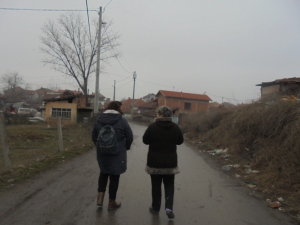“We need people.”
By far, this was the most commonly uttered need as we traveled to Roma communities throughout Bulgaria and Macedonia.
Money was not first on the list of needs, but people. This must be connected to another common theme I have observed in pastors and people working in Roma communities all over Eastern Europe: a struggle with what appears to be stress-induced health issues or illness.
They carry many burdens without fellow leaders to share them, and rarely do they place a priority on “self-care.”
“People do come and do projects, ” one Roma pastor in Macedonia said, “but then they leave and nothing goes deeper and no relationships are formed. And most missionaries work with Macedonians or Albanians. Evangelistic outreaches that come and do drama and music on the streets have limited effectiveness, but staying and being with people in their homes is where things can go deeper.
Despite seeing negative effects from short-term mission projects, I am not one to throw the baby out with the bathwater. Mission “projects” certainly have their usefulness and value; but most lack intentionality and a vision toward long term relationships. Few realize the burden and stress the locals feel while trying to accommodate the short-term plans.
Without careful planning done in the spirit of a listening humility and open dialogue, short-term mission projects can become a zero-sum game—an exciting cross-cultural experience comes at a cost for the local leadership.
Not properly researching the context contributes to the probability of a zero-sum game. It might surprise some to know that Macedonia, a small country with a population of around 2 million, is primarily an Orthodox country (64%); however, the Muslim population, makes up about 33% (2002 census). (For more background on Macedonia, read this insightful article by Kostake Milkov).
Because of these dynamics, there are only a handful of Roma churches in the whole country, and most of them are small. And the questions and obstacles they face are different than in Croatia, Serbia, Romania, or Bulgaria, for example, where the Muslim populations are much smaller.
“A graveyard.” The Roma pastor told me matter-of-factly when we were discussing barriers to the gospel in his particular town.
“We are not allowed to be buried in the Orthodox or the Muslim graveyards; and people worry about what will happen to their bodies when they die. It is a very serious concern for them.” He smiled. “I myself don’t worry about my body, but I also don’t want to leave that burden to my family when I die.”
I stared at him in disbelief. “So you are telling me that if you had the money and ability to purchase land for a graveyard, this would remove a big obstacle for people to come to faith?”
Of course, missiologically speaking, this is probably only one barrier in a complex situation—but it sounds as if it is a significant one.
Another difficulty in establishing growing disciples is the constant stream of people leaving to go find work in Western Europe, a common story in this part of the world. “It is difficult for the Roma to find work among Macedonians,” he tells me.
He guesses that there are about 2000 Macedonian Roma in Austria. “I would love to send Roma missionaries to that community to plant a church,” he tells me.
But he alone pastors his small, struggling church, so his vision will have to wait…for more people to come.
“During the night Paul had a vision: there stood a man of Macedonia pleading with him and saying, “Come over to Macedonia and help us.” 10 When he had seen the vision, we immediately tried to cross over to Macedonia, being convinced that God had called us to proclaim the good news to them.” Acts 16





